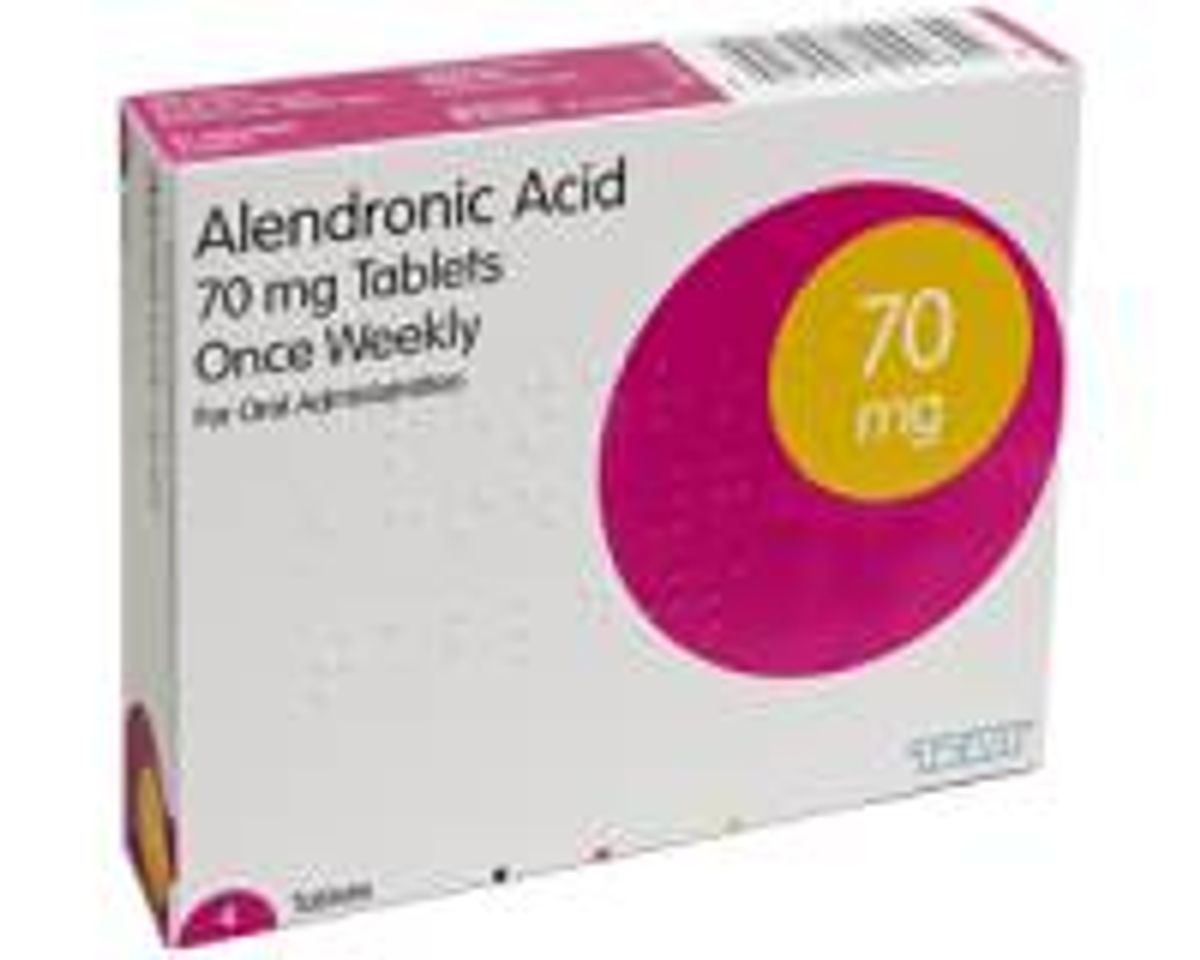
Alendronic Acid
- Prevents osteoporosis after menopause
- Reduces the risk of bone fractures
- For postmenopausal women only
- Take tablet in the morning on an empty stomach
- This medicine is a prescription-only medicine. Add the product to your shopping cart to start an (online) consultation.
About Alendronic Acid
Did you know there is a link between menopause and osteoporosis? Your bones are constantly being renewed. Under the influence of hormones, particularly oestrogen, bone tissue is added and withdrawn from your bones every day. But when you enter perimenopause, the amount of oestrogen produced by your body reduces, leading to a drop in bone density. This increases the risk of osteoporosis, a disease in which bones (in particular in the spine, hip and wrist) become weak and brittle, causing them to break or fracture more easily.
Alendronic Acid is prescribed to treat or prevent osteoporosis. This medicine prevents the loss of bone that occurs in women after they have been through menopause and has been shown to help to rebuild bone. This reduces the risk of spine and hip fractures.
How to use Alendronic Acid
Note: It is very important to follow the instructions below carefully. This will help the tablet reach your stomach quickly, reducing the chance of irritating your gullet (oesophagus, the tube that connects your mouth with your stomach).
1. Swallow your Alendronic Acid tablet whole with a full glass of tap water only (not less than 200 ml) after getting up for the day and before taking any food, drink, or other medicine.
- Do not take with mineral water (still or sparkling).
- Do not take with coffee or tea.
- Do not take with juice or milk.
- Do not crush or chew the tablet or allow it to dissolve in your mouth.
2. Do not lie down, stay fully upright (sitting, standing or walking) for at least 30 minutes after swallowing the tablet. Do not lie down until after your first food of the day.
3. Do not take Alendronic Acid at bedtime or before getting up for the day.
4. If you develop difficulty or pain upon swallowing, chest pain, or new or worsening heartburn, stop taking Alendronic Acid and contact your doctor immediately.
5. After swallowing your Alendronic Acid tablet, wait at least 30 minutes before taking your first food, drink, or other medicine of the day, including antacids, calcium supplements and vitamins. Alendronic Acid is effective only if taken when your stomach is empty.
Dosage
Dosage varies per person and is determined by a doctor depending on the symptoms. The general dosage guidelines are as follows:
- Adults: one 10-mg tablet once a day.
This guideline applies to the treatment of osteoporosis in men and in postmenopausal women, and for the treatment and prevention of steroid-induced osteoporosis in postmenopausal women who do not use oestrogen-based hormone replacement therapy (HRT).
This medicine is not suitable for use in children.
Alcohol/driving
This medicine does not interact with alcohol.
There have been side effects (for example blurred vision, dizziness and severe bone, muscle or joint pain) reported with Alendronic Acid that may affect your ability to drive or operate machinery. Stay out of traffic and do not operate heavy machinery if you experience these side effects.
Taken too much/forgot to take/stop taking Alendronic Acid
If you take too many tablets by mistake, drink a full glass of milk and contact your doctor immediately. Do not make yourself vomit, and do not lie down.
Missed a dose?
- If you forget to take a dose, skip the missed dose.
- Take the next dose as normal.
- Do not take a double dose to make up for the forgotten one.
Do not stop using Alendronic Acid without talking to a doctor first.
When not to use Alendronic Acid
Do not take this medicine if:
- You are allergic to any of the ingredients in this medicine (see section ‘What Alendronic Acid contains').
- You have certain problems with your gullet (oesophagus) such as narrowing or difficulty swallowing.
- You cannot stand or sit upright for at least 30 minutes.
- Your doctor has told you that you have low blood calcium.
If you think any of these apply to you, do not take the tablets. Talk to your doctor first and follow the advice given.
When should this medicine be used with caution?
It is important to tell your doctor before taking Alendronic Acid if:
- You suffer from kidney problems.
- You have, or have recently had, any swallowing or digestive problems.
- Your doctor has told you that you have Barrett's oesophagus (a condition associated with changes in the cells that line the lower oesophagus).
- You have been told you have low blood calcium.
- You have poor dental health, gum disease, a planned dental extraction or you don't receive routine dental care.
- You have cancer.
- You are undergoing chemotherapy or radiotherapy.
- You are taking angiogenesis inhibitors.
- You are taking corticosteroids.
- You are or have been a smoker (as this may increase the risk of dental problems).
You may be advised to have a dental check-up before starting treatment with Alendronic Acid.
Pregnancy and breastfeeding
This medicine is not intended for women who are in the fertile age bracket. You should not take Alendronic Acid if you are or think you may be pregnant, or if you are breastfeeding.
Other medicines and Alendronic Acid
Please tell your doctor or pharmacist if you are using, have recently used or might use any other medicines, including medicines obtained without a prescription, herbal medicines or other natural products.
It is likely that calcium supplements, antacids, and some oral medicines will interfere with the absorption of Alendronic Acid if taken at the same time.
Certain medicines for rheumatism or long-term pain called NSAIDs (e.g., acetylsalicylic acid or ibuprofen) might cause digestive problems. Therefore, caution should be used when these medicines are taken at the same time as Alendronic Acid.
Side effects
Like all medicines, this medicine can cause side effects, although some people may not experience any.
SERIOUS SIDE EFFECTS (see your doctor immediately if you notice any of the following side effects):
Common (may affect up to 1 in 10 people):
- Heartburn, difficulty swallowing, pain upon swallowing, ulceration of the gullet (oesophagus) which can cause chest pain, heartburn or difficulty or pain upon swallowing.
Rare (may affect up to 1 in 1,000 people):
- Allergic reactions such as hives, swelling of the face, lips, tongue and/or throat, possibly causing difficulty breathing or swallowing; severe reactions to the skin, mucous membranes in the mouth or nose, eyes or genitals.
- Pain in the mouth, and/or jaw, swelling or sores inside the mouth, numbness or a feeling of heaviness in the jaw, or loosening of a tooth. Contact your doctor and dentist if you experience such symptoms.
- Unusual fracture of the thigh bone particularly in patients on long-term treatment for osteoporosis may occur rarely. Contact your doctor if you experience pain, weakness or discomfort in your thigh, hip or groin, or bone, muscle and/or joint pain which is severe.
OTHER SIDE EFFECTS
Very common (may affect more than 1 in 10 people):
- Bone, muscle and/or joint pain which is sometimes severe.
Common (may affect up to 1 in 10 people):
- Joint swelling.
- Abdominal pain, uncomfortable feeling in the stomach or belching after eating, constipation, full or bloated feeling in the stomach, diarrhoea, flatulence.
- Hair loss, itching.
- Headache, dizziness.
- Fatigue, swelling of the hands or legs.
Uncommon (may affect up to 1 in 100 people):
- Nausea.
- Vomiting.
- Irritation or inflammation of the gullet (oesophagus).
- Black or tar-like stools.
- Blurred vision, pain or redness in the eye.
- Rash, reddened skin.
- Transient flu-like symptoms, such as aching muscles, generally feeling unwell and sometimes with fever usually at the start of treatment.
- Taste disturbance.
For a list of rare side effects, see the package leaflet. Consult a doctor if you experience side effects, also if the side effects are not listed on the package leaflet.
What Alendronic Acid contains
The active substance is alendronic acid (as alendronate socium). Each tablet contains 10 mg of alendronic acid (as alendronate sodium). The other ingredients are: lactose anhydrous, microcrystalline cellulose (E460), croscarmellose sodium and magnesium stearate.
Package leaflet
How does having an online consultation with a doctor work?

1. Choose your preferred treatment
Select your preferred treatment and complete the accompanying digital medical questionnaire.

2. Your order request is reviewed by a doctor
A doctor will review your order within 48 hours and forward the prescription to a pharmacy.

3. Your order is shipped by the pharmacy
Your order will be shipped to your home within three to five working days free of charge.










